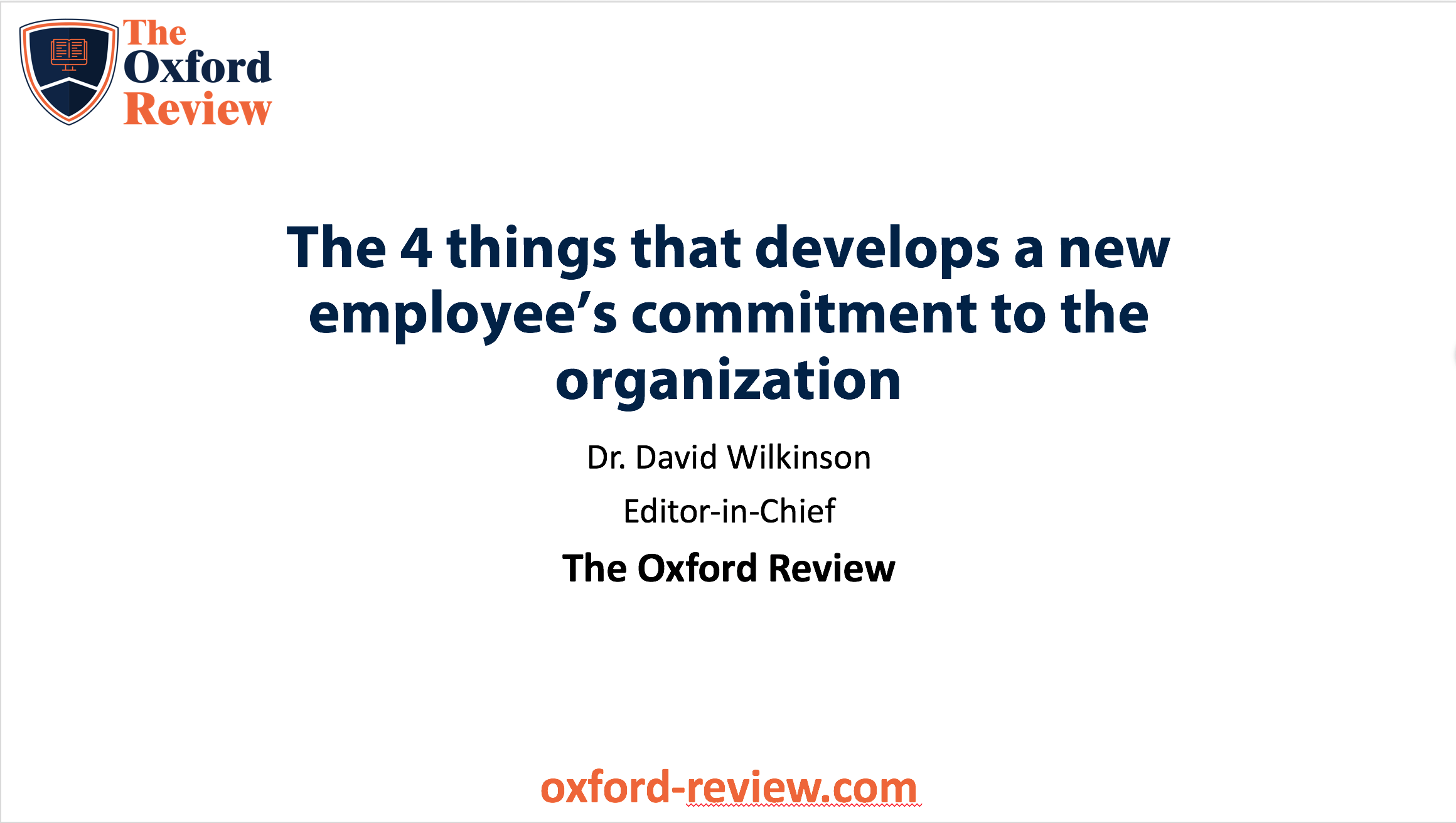- in Blog by David Wilkinson
- |
- 1 comments
The Oxford Review Video Research Briefing: The 4 things that develop a new employee’s commitment to the organisation

In this Video Research Briefing we look at The 4 things that develop a new employee’s commitment to the organisation https://youtu.be/YRmbj69SyyE Members get regular, short, to the point and easy to digest research briefings, video research briefings, infographics and more.
Read moreWhat develops a new employee’s commitment to the organisation?

A paper just published in the Journal of Organizational Behaviour looks at what makes a difference to new employees’ commitment to the organization. Organisational Commitment Older New Employees Skills Own Initiative Progression Summary Reference Organizational commitment Organizational commitment has been positively associated with a range of outcomes like productivity, intention to stay, engagement in organizational citizenship […]
Read more- in Blog by David Wilkinson
- |
- 1 comments
New study finds the difference between successful and less successful entrepreneurs…

What makes the difference between successful and less successful entrepreneurs? A brilliant study has just been published of 198 SME’s to find out the the basis of the difference between successful and unsuccessful companies and in particular the entrepreneurs that drive them. Our research briefing explains the study and the findings for you. Interestingly they […]
Read more- in Blog , Oxford Review by David Wilkinson
Emotional Competence and passionate restraint – new research

In the Oxford Review this month our members get a research briefing about a brand new study looking at emotional competence and the concept of passionate restraint. Among other fascinating findings this study found differences in how people perceived women and men displaying both emotional competence and passionate restraint. We explore the implications for organisations. §§§ This is […]
Read more- in Blog , Leadership , Management , Organisational Development , Research by David Wilkinson
- |
- 1 comments
Why most business strategies fail – eventually

A paper just published by colleagues at the Saïd Business School at the University of Oxford argues that business planning by organisations needs to involve ‘scenario research’. Scenario research involves looking at how the business would benefit or fail from a range situations. Turbulent times One of the exciting things about business is that it […]
Read more- in Blog , Human Resources , Leadership , Management , Organisational Development , Research by David Wilkinson
How organisations deal with dilemmas and emergencies – Press & Balance

This is the final part of 3 articles about how organisations deal with dilemmas and emergencies: Part 1: ‘New research: Organisational responses to dilemmas and emergencies’ Part 2: 6 ways organisations deal with dilemmas In this post we have a look at the conclusions of this research… Press and balance The researchers found that there are two […]
Read more- in Blog , Coaching , Human Resources , Leadership , Learning , Management , Organisational Change , Organisational Development , Research by David Wilkinson
- |
- 1 comments
6 ways organisations deal with dilemmas

Following on from the previous post ‘New research: Organisational responses to dilemmas and emergencies’ in this post I will look at what the research says about the 6 ways organisations deal with dilemmas. It has previously been found that there are six main ways organisations deal with these secondary order tensions, paradoxes and dilemmas: Denial. The organisation just […]
Read more- in Blog , Oxford Review by David Wilkinson
- |
- 1 comments
This weeks research from the Oxford Review

This week our members got the following research briefings: A fascinating study that looked at teams from a game theory perspective and sheds some interesting light about the difference between teams and groups. I have already used this paper to spark a very useful conversation about team work in a community of practice I run. […]
Read moreNew research: Organisational responses to dilemmas and emergencies

In this the first of a three part posting I will look at an interesting and useful large-scale research study examining how the emergency services cope with difficult incidents in Europe. The paper has just been published by researchers from Central Michigan University and the University of Illinois. Part 1 (this part) The dilemmas organisations […]
Read moreMaking evidence-based practice work. Part 2 – solutions

This post follows on from the previous post Making evidence-based practice work: The 3 key challenges In this post I will look at what the research findings are: evidence-based solutions Solutions The researchers discovered that there are two primary pre-requisites for successful implementation of evidence-based practice: evidence-based solutions. Primary pre-requisites for successful implementation of evidence-based practice Management involvement […]
Read more